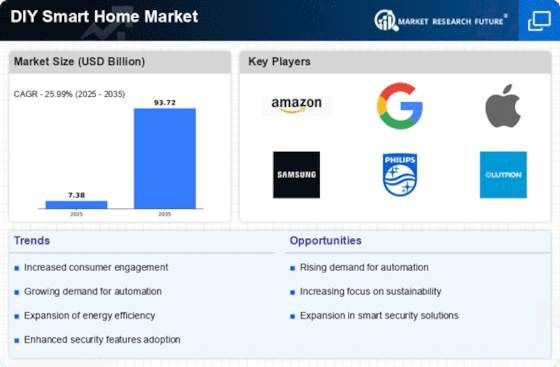Top Industry Leaders in the DIY Smart Home Market

Competitive Landscape of DIY Smart Home Market
The DIY smart home market, where technology transforms into a friendly butler. This growth is fueled by our insatiable desire for convenience, energy efficiency, and a touch of futuristic magic in our everyday lives. In this dynamic space, established giants and nimble startups clash, all vying for a slice of the smart home pie. Let's dissect the key strategies and players shaping this captivating landscape.
Some of the DIY Smart Home companies listed below:
- Nest Labs Inc.
- Honeywell International Inc.
- Assa Abloy Group
- Acuity Brands Inc.
- Johnson Controls Inc.
- Schneider Electric SE
- United Technologies Corporation
- Samsung Electronics Co. Ltd.
- Crestron Electronics Inc.
Strategies Adopted by Players:
-
Technological Differentiation: Players compete fiercely on technological advancements, focusing on factors like interoperability between devices (standards like Zigbee and Z-Wave), AI-powered automation routines, seamless voice control integration, and data security and privacy protections. Developing innovative smart products, improving user interfaces, and offering advanced analytics for energy consumption and home environment are key differentiators. -
Catering to Diverse Needs: Expanding beyond basic smart lighting and voice-controlled assistants to address specific needs like home security, entertainment, health and wellness, and kitchen convenience unlocks new market segments and drives customer adoption. Partnering with appliance manufacturers and other home automation service providers is crucial for expanding offerings. -
Addressing Cost and Installation Friendliness: Making smart home devices more affordable and easy to install is vital for widespread adoption. Developing plug-and-play devices, offering DIY installation guides and tutorials, and providing subscription-based services with professional installation options are key strategies. -
Building Ecosystems and Partnerships: Fostering partnerships with device manufacturers, software developers, and cloud service providers expands smart home functionality and offers a wider range of compatible products. Creating an open and interoperable ecosystem is crucial for attracting customers and encouraging long-term engagement.
Factors for Market Share Analysis:
-
Revenue Generated: This straightforward metric reflects a company's market penetration and financial strength. -
Number of Devices Sold: Understanding the volume of smart home devices shipped provides insight into customer adoption and market reach. -
Technology Innovation: Assessing a company's investment in R&D, patent portfolio, and novel smart home functionalities helps gauge its future competitive edge. -
Customer Satisfaction: Analyzing user reviews, ratings, and loyalty metrics reveals how effectively a company caters to customer needs and builds brand reputation.
Latest Company Updates:
Wyze Labs
November 14, 2023- Released a new outdoor home security camera with advanced night vision and AI-powered object detection, expanding its security product line and competing with established players.
Aqara Technologies
September 10, 2023- Opened a new smart home experience center showcasing its full range of products and providing hands-on demonstration for potential customers.
Eve Systems
December 5, 2023- Announced a partnership with a home security company to integrate its smart sensors and switches into professional security systems, offering homeowners additional control and security options.









